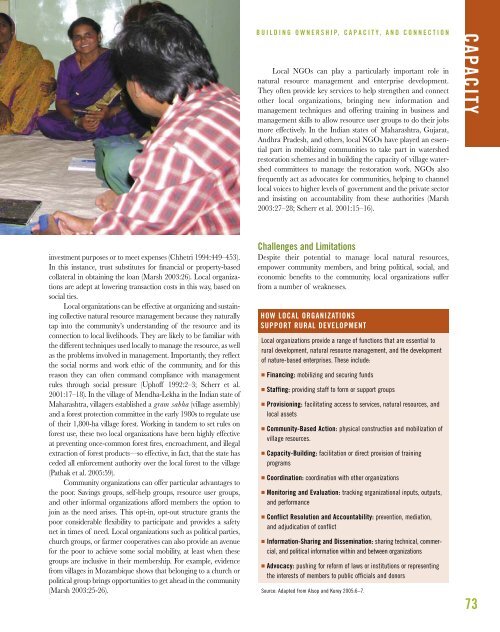Growing the Wealth of the Poor - World Resources Institute
Growing the Wealth of the Poor - World Resources Institute
Growing the Wealth of the Poor - World Resources Institute
You also want an ePaper? Increase the reach of your titles
YUMPU automatically turns print PDFs into web optimized ePapers that Google loves.
B U I L D I N G O W N E R S H I P, C A P A C I T Y , A N D C O N N E C T I O NLocal NGOs can play a particularly important role innatural resource management and enterprise development.They <strong>of</strong>ten provide key services to help streng<strong>the</strong>n and connecto<strong>the</strong>r local organizations, bringing new information andmanagement techniques and <strong>of</strong>fering training in business andmanagement skills to allow resource user groups to do <strong>the</strong>ir jobsmore effectively. In <strong>the</strong> Indian states <strong>of</strong> Maharashtra, Gujarat,Andhra Pradesh, and o<strong>the</strong>rs, local NGOs have played an essentialpart in mobilizing communities to take part in watershedrestoration schemes and in building <strong>the</strong> capacity <strong>of</strong> village watershedcommittees to manage <strong>the</strong> restoration work. NGOs als<strong>of</strong>requently act as advocates for communities, helping to channellocal voices to higher levels <strong>of</strong> government and <strong>the</strong> private sectorand insisting on accountability from <strong>the</strong>se authorities (Marsh2003:27–28; Scherr et al. 2001:15–16).CAPACITYinvestment purposes or to meet expenses (Chhetri 1994:449–453).In this instance, trust substitutes for financial or property-basedcollateral in obtaining <strong>the</strong> loan (Marsh 2003:26). Local organizationsare adept at lowering transaction costs in this way, based onsocial ties.Local organizations can be effective at organizing and sustainingcollective natural resource management because <strong>the</strong>y naturallytap into <strong>the</strong> community’s understanding <strong>of</strong> <strong>the</strong> resource and itsconnection to local livelihoods. They are likely to be familiar with<strong>the</strong> different techniques used locally to manage <strong>the</strong> resource, as wellas <strong>the</strong> problems involved in management. Importantly, <strong>the</strong>y reflect<strong>the</strong> social norms and work ethic <strong>of</strong> <strong>the</strong> community, and for thisreason <strong>the</strong>y can <strong>of</strong>ten command compliance with managementrules through social pressure (Uph<strong>of</strong>f 1992:2–3; Scherr et al.2001:17–18). In <strong>the</strong> village <strong>of</strong> Mendha-Lekha in <strong>the</strong> Indian state <strong>of</strong>Maharashtra, villagers established a gram sabha (village assembly)and a forest protection committee in <strong>the</strong> early 1980s to regulate use<strong>of</strong> <strong>the</strong>ir 1,800-ha village forest. Working in tandem to set rules onforest use, <strong>the</strong>se two local organizations have been highly effectiveat preventing once-common forest fires, encroachment, and illegalextraction <strong>of</strong> forest products—so effective, in fact, that <strong>the</strong> state hasceded all enforcement authority over <strong>the</strong> local forest to <strong>the</strong> village(Pathak et al. 2005:59).Community organizations can <strong>of</strong>fer particular advantages to<strong>the</strong> poor. Savings groups, self-help groups, resource user groups,and o<strong>the</strong>r informal organizations afford members <strong>the</strong> option tojoin as <strong>the</strong> need arises. This opt-in, opt-out structure grants <strong>the</strong>poor considerable flexibility to participate and provides a safetynet in times <strong>of</strong> need. Local organizations such as political parties,church groups, or farmer cooperatives can also provide an avenuefor <strong>the</strong> poor to achieve some social mobility, at least when <strong>the</strong>segroups are inclusive in <strong>the</strong>ir membership. For example, evidencefrom villages in Mozambique shows that belonging to a church orpolitical group brings opportunities to get ahead in <strong>the</strong> community(Marsh 2003:25-26).Challenges and LimitationsDespite <strong>the</strong>ir potential to manage local natural resources,empower community members, and bring political, social, andeconomic benefits to <strong>the</strong> community, local organizations sufferfrom a number <strong>of</strong> weaknesses.HOW LOCAL ORGANIZATIONSSUPPORT RURAL DEVELOPMENTLocal organizations provide a range <strong>of</strong> functions that are essential torural development, natural resource management, and <strong>the</strong> development<strong>of</strong> nature-based enterprises. These include:■ Financing: mobilizing and securing funds■ Staffing: providing staff to form or support groups■ Provisioning: facilitating access to services, natural resources, andlocal assets■ Community-Based Action: physical construction and mobilization <strong>of</strong>village resources.■ Capacity-Building: facilitation or direct provision <strong>of</strong> trainingprograms■ Coordination: coordination with o<strong>the</strong>r organizations■ Monitoring and Evaluation: tracking organizational inputs, outputs,and performance■ Conflict Resolution and Accountability: prevention, mediation,and adjudication <strong>of</strong> conflict■ Information-Sharing and Dissemination: sharing technical, commercial,and political information within and between organizations■ Advocacy: pushing for reform <strong>of</strong> laws or institutions or representing<strong>the</strong> interests <strong>of</strong> members to public <strong>of</strong>ficials and donorsSource: Adapted from Alsop and Kurey 2005:6–7.73
















